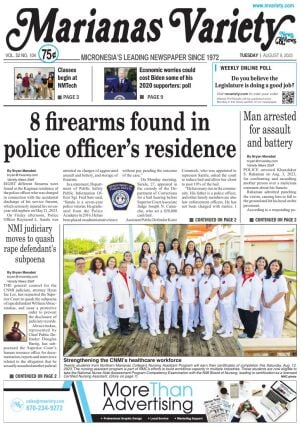FOR author Nancy Bo Flood, who compiled “Pacific Island Legends,” “Micronesian Legends” and “Marianas Island Legends,” recording mythology has been a worthy, decades-long endeavor.
“I write what I experience, and what I love,” Flood said. “I love Saipan, I love the Pacific.”
Flood was once a resident of Saipan, where she taught at Northern Marianas College for over a decade. She now lives in Colorado, but was recently back on island as a guest presenter for the “Saipan’s Land and Sea: Battle Scars & Sites of Resilience” program, for which she presented excerpts from her work to around 60 educators who had flown to Saipan for professional development.
Flood spoke to Variety about the importance of legends and why they’re still vital to people in this age of technology and social media.
“I find legends so full of wisdom and so full of the heart of what the culture values and believes in,” Flood said. “Stories involve not only information and ideas, but it involves emotions, the heart, how we feel.”
For around 30 years now, her books have been featured in classrooms and libraries in the CNMI, Guam, Hawaii, and wherever Hawaii-based publisher Bess Press books are sold.
The first two books in the series — “Pacific Island Legends” and “Micronesian Legends” — are an anthology of legends, myths and folk tales from around the Pacific. For “Marianas Island Legends,” Flood went a different route, including interviews, ghost stories, and well-known Chamorro and Refaluwasch legends in one publication.
Flood said the impetus to create the three books came in the 1990s, when she was an instructor at Northern Marianas College. While working among the students here, Flood noticed an important need that she could fill.
“As an instructor, there were no courses for Pacific Literature,” she said. “We learn what we can relate to, and for the students here, if you don’t have anything they can relate to it’s meaningless to them.”
On a mission to create class material to share with her students, Flood went to Bess Press in Honolulu, with sample chapters and an outline for “Pacific Island Legends.”
“Bess Press was interested in it right away,” Flood said, adding that she utilized archives at the University of Hawaii at Manoa, the Bishop Museum, and NMC as sources.
Flood said in the process of writing, she tried to find three versions of every legend she was incorporating into her anthologies. An additional source of information were people from the different Pacific Islands she was writing about. Flood said she sought their feedback when writing the stories.
When it came time to do a book on Marianas legends, she knew she wanted it to be different.
“I really wanted the voices to be of the people,” Flood said. To that end, she included a variety of contributors from different corners of the Marianas.
For example, high school students contributed to the “Shiver Stories” chapter, and second grade students of Tanapag Elementary School offered their perspective on “respetu.”
Flood also included a chapter on Chamorro food recipes.
An overall observation Flood has about Pacific cultures is the importance they place on respect to other humans and to the land and ocean.
For Flood, mythology and legends are important because they contain such lessons, which help individuals form healthy relationships.
“We get our moral compass from our families, certainly, but [especially from] the beliefs and the stories that are shared within our family,” Flood said. “Our stories give us lessons on how we behave as human beings, how we behave with each other, and behave on the earth.”
Flood said as modern people separate from their cultures’ myths and legends, and instead turn to a wider, globalized, online culture, they miss out on the humanizing element of storytelling.
“Online it’s very surface,” Flood said. “If we’re hearing online that it’s OK to hate other people, it’s OK to denigrate other people, then it opens up those doors of doing it.”
“What stories give us is that bigger picture, a wider perspective,” she added. “We can go to other cultures and see their stories inform us and realize we’re all in this together. [For example] the Greeks were also dealing with the same problems, and this is what they’re trying to tell us, this is what they learned — that if you’re going to be false, you’re going to lie, you’re going to be arrogant, you’re going to cause damage.”
Flood said the people of the CNMI are capable of adding to the body of published work coming out of the Marianas.
“Your stories matter. Your stories are important,” she said, when asked what her message is to people from the CNMI who are interested in creative writing.
Her advice is to find like-minded people to synergize and collaborate with. Flood also emphasizes persevering when writing — and especially editing — gets tough.
“Believe in your stories and believe in yourself,” she said. “Write your stories because they truly do matter. Only you can write your stories.”

















